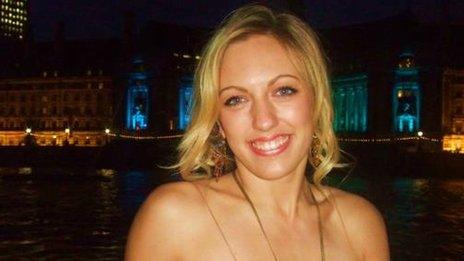Italy cruise ship Costa Concordia: Search for missing
- Published
The BBC's Alan Johnston says it "must have been an extraordinarily harrowing experience"
Emergency teams in Italy are racing to rescue about 40 people still believed to be missing after a cruise ship ran aground off the country's west coast.
Divers are searching rooms in the Costa Concordia, which is lying on its side 200m (650ft) off Giglio island.
It sank on the first night of a Mediterranean cruise on Friday. Most of its 4,000 passengers and crew reached land by lifeboats but some swam ashore.
Three people died. Late on Saturday, two people were found alive on board.
Rescuers have reached a man and a woman stranded in a cabin two decks down on the half-submerged ship, according to Italian media reports.
The precise number of those who remain unaccounted for is unclear. Late on Saturday local official Giuseppe Linardi said up to 41 people were missing.
Earlier he had put the figure at 70, adding that some might still be housed in private homes on Giglio - where the survivors first reached land.
BBC's Adam Parsons: "You can see a huge gash, perhaps fifty metres long"
Coast guard captain Cosimo Nicastro told Italian TV that divers had carried out an extensive search of the waters near the vessel and found no bodies.
But he added that there still might be some "in the belly of the ship".
A large gash can be seen in the hull of the Costa Concordia as it lies on its side.
Italian, German, French and British nationals were among the 3,200 passengers on board. There were also 1,000 crew.
Those who died include two French passengers and a Peruvian crewman.
Some passengers were rescued by lifeboat, helicopters plucked to safety some who were trapped on the ship, and others jumped from the ship into the cold sea.
About 40 people are being treated in hospital.
The captain was being held for questioning, Italian TV reported. Prosecutors were not immediately available for comment.
'Delayed drill'
Passenger Luciano Castro told Ansa news agency: "We heard a loud noise while we were at dinner as if the keel of the ship hit something."
"The ship started taking in water through the hole and began tilting."
Some passengers told the Associated Press news agency that the crew had failed to give instructions on how to evacuate the ship.
An evacuation drill was scheduled for Saturday afternoon.
"It was so unorganised, our evacuation drill was scheduled for 17:00 (16:00 GMT)," Melissa Goduti, 28, from the US told AP. "We had joked what if something had happened today."
Passenger Mara Parmegiani told Italian media there were "scenes of panic".
"We were very scared and freezing because it happened while we were at dinner so everyone was in evening wear.
"We definitely didn't have time to get anything else. They gave us blankets but there weren't enough," she said.
Several passengers compared the accident to the film Titanic, about the sinking of the giant ocean liner in April 1912 which claimed more than 1,500 lives.
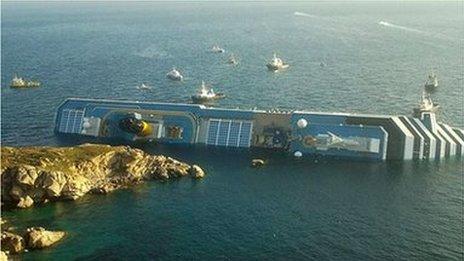
The cruise operators thanked the citizens of Giglio for rescuing those on board
"I can easily understand the comparisons to the film, how it must have been on the Titanic, or in a fiction film," passenger Francesca Sinatra said.
Hypothermia
The Costa Concordia, which is operated by Costa Cruises, had sailed from Civitavecchia near Rome on Friday on a regular weekly Mediterranean cruise when it ran aground.
The president of Costa Cruises, Gianni Onorato, said the main task for the company was now to assist passengers and crew, and help repatriate them.
He said it was difficult to determine what had happened, but that the ship had experienced a blackout after hitting "a big rock".
Mr Onorato added: "We will be working in full transparency with Italian authorities" to understand the causes of the disaster.
He said normal lifeboat evacuation had become "almost impossible" because the ship had listed so quickly.
Rescued passengers were initially accommodated in hotels, schools and a church on Giglio.
They have now been moved to the mainland, Elizabeth Nanni from the island's tourist information service told the BBC.
"Usually there are 700 people on the island at this time of year, so receiving 4,000 and some in the middle of the night wasn't easy," she said. "Some people jumped in the sea so they had hypothermia."
Some "tens" of British passengers are believed to have been on board, said the UK Foreign Office, which has sent a team to the area.

- Published14 January 2012
- Published14 January 2012
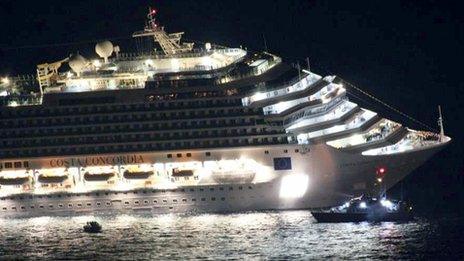
- Published14 January 2012
- Published14 January 2012
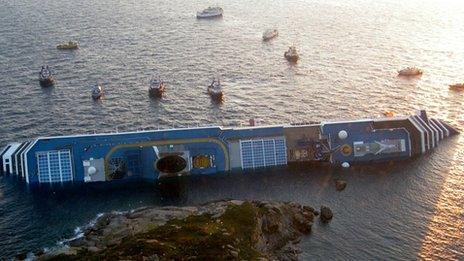
- Published14 January 2012
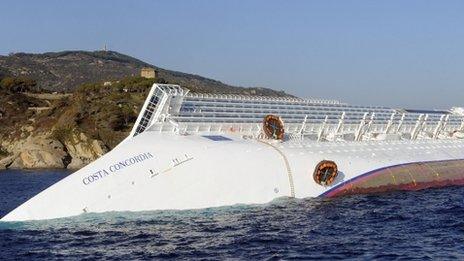
- Published14 January 2012
- Published14 January 2012
- Published14 January 2012
